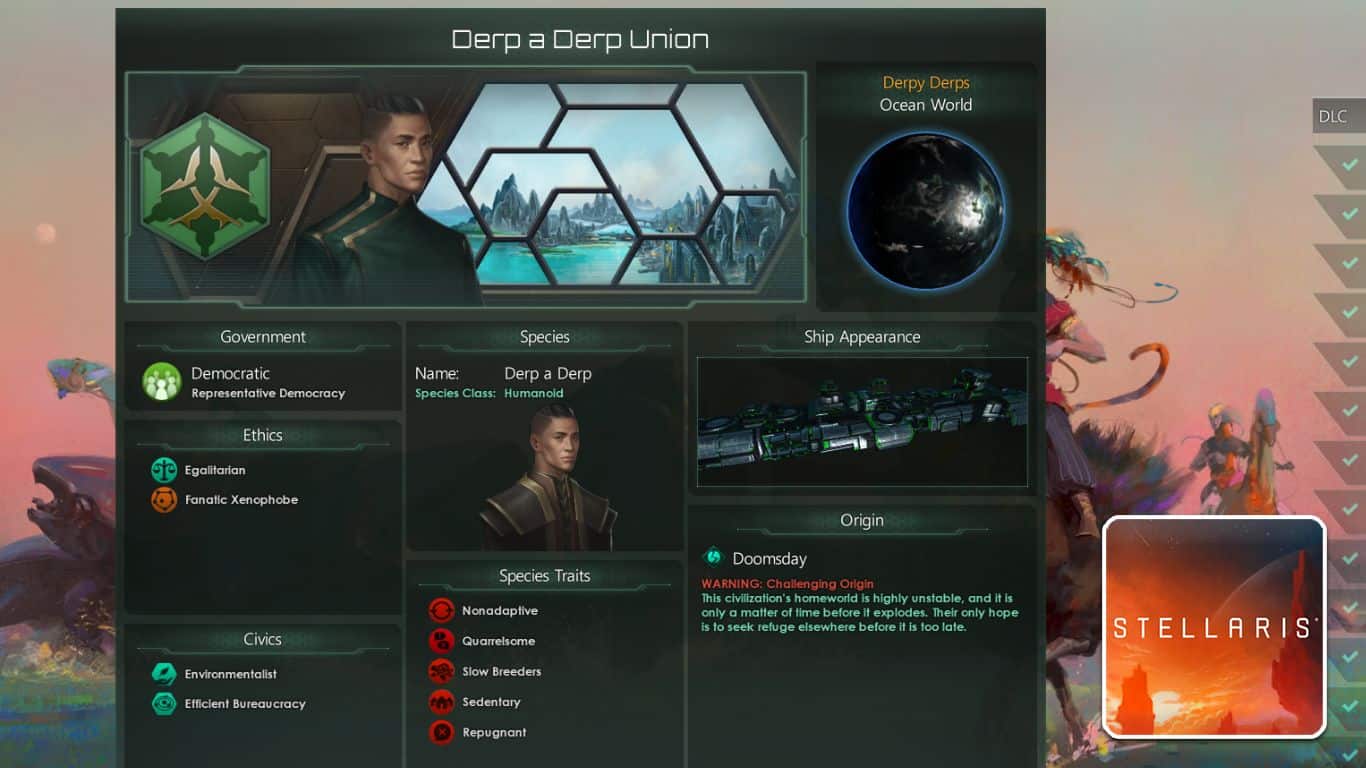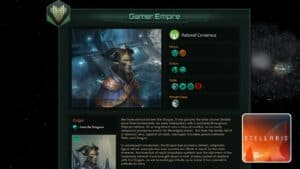Despite the clear oxymoron, negative traits can indeed be a good thing in Stellaris. If you want to know which ones are the best negative traits, this guide will teach you all you need to know.
Whenever you make a species to play, as in Stellaris, the traits you pick for your species are one of the most important decisions you will make. The greatest species builds use negative traits to their advantage.
Recommended Read: How to Beat Fallen Empires in Stellaris
You have to be careful when picking negative traits. You will be stuck with the decision you made for a long time, so use this guide to help you make the correct decisions.
The best organic negative traits in Stellaris are fleeting, slow learners, deviants, and unruly. The best robotic pop negative traits are repurposed hardware, high bandwidth, and luxurious.
Table of Contents
What Are the Best Negative Traits in Stellaris?
Whenever you start a game of Stellaris, you must pick traits for your species. These are the features and quirks that distinguish your species from others in the galaxy.
Your species might be muscular, great at engineering, long-lived, breed fast, or even be great farmers. You may notice everything listed are positive traits. Stellaris also allows you to pick negative traits as well.
These negative traits make your species weaker in some way. They make your species frail, dim-witted, or wasteful.
Why on earth would you choose to add negative traits to your founding species? Does that make them weaker? It does, but taking on negative traits unlocks some unique benefits.
Not all traits are created equal. Each positive trait has a cost associated with it, from 1 to 4.
The stronger a trait, the greater the cost. You only have two trait points to spend when you begin the game, meaning you cannot buy the strongest traits for your species.
That is where negative traits come in. Equipping a negative trait to your species gives you either one or two extra trait points to spend, depending on how “bad” the trait is.
With that in mind, the magic comes from taking minimal-impact negative traits, which allow you to buy high-impact positive traits. This rule is true for both biological and mechanical empires.
Another popular tactic is taking negative traits that are less impactful in the early game. Then, when you unlock more trait points with research, remove those traits before they become an issue for your empire.
Best Negative Biological Traits
Standard empires and Hive Mind empires select from the same pool of traits. The positive traits you can select can impact almost every aspect of the game.
They can increase pop growth, improve research speed, increase resource production, and more. There is a lot less choice when it comes to negative traits.
We want to keep a few rules in mind when selecting negative traits. We want it to minimize the impact it has on our empire.
Only take them if they allow you to adopt a positive trait you want. Finally, they do not clash with any positive modifiers you have from other sources (civics, ethics, etc.).
Four negative traits match these criteria in the biological trait pool. These four can slot into almost any empire build, empowering you to select better traits for your founder species.
In no particular order, they are:
Fleeting
The Fleeting negative trait reduces a leader’s life span by 10 years, and in the case of Lithoid pops, it is instead reduced by 25 years. In return, you get one extra trait point to spend.
The best thing about the fleeting trait is that you will forget you have it equipped on your pops.
10 years is nothing in the Stellaris timescale; all this means is that you have to pay the cost of a replacement leader a bit earlier. The cost of buying new leaders isn’t a big one either.
The technology you unlock while playing will mitigate the effects caused by this trait. Many technologies increase lifespans; even with fleeting, it is not uncommon to have a leader live way past 150 years old.
This pick is extra potent on Lithoid leaders. Lithoids live 50 years longer on average, so even with the 25-year penalty, you still have a good 25 years of life with your Lithoid leaders.
Slow Learners
Another trait that only affects the leaders of your empire. The slow learner trait reduces the experience your leaders gain by ten percent. Equipping this trait will provide you with one extra trait point to spend.
The release of the Galactic Paragons DLC and the patch that came with it sought to improve the leader system in Stellaris.
The developers did a good job for the most part, but the leader-level system is still of minor importance in the big picture.

Leaders levelling up a little bit slower is never going to be a factor in 99% of games in Stellaris. So taking this trait to improve research or unity generation is never going to be a bad idea.
This trait is available to both hive minds and standard biological empires.
Deviants
The deviant trait doesn’t affect your leaders, but instead your general population. Pops that have this trait will suffer a 15% reduction in governing ethics attraction.
If you don’t know what that means, believe me when I say it doesn’t matter that you don’t know. I am a 1000-hour Stellaris player, and I only learned what governing ethics attraction meant a few months ago.
The only reason I learned what it meant was for a different guide I had to write. In brief, it means your pops are 15% less likely to embrace your government ethics. Which may mean a very minor unity production penalty.
This is beyond worth the extra trait point you receive for taking it. The only problem it has is that hive-mind empires cannot make use of it.
Unruly
This trait is different from the others mentioned so far. While the other traits were hyper-low impact and only provided one extra trait point, unruly starts as low impact, but the longer you play with it, the worse it gets.
It also gives you two extra trait points to spend. Unruly increases the amount of empire size your pops produce by 10%. The larger your empire size statistic is, the more expensive upgrades become for you.
High empire size means that research is slower, upkeep costs are higher, and traditions unlock slower. As you can see, empire size is something you want to manage well, so why take on a trait that will increase it?
When you begin the game, you don’t have a lot of pops, and therefore, your pops don’t produce much empire size. As the game goes on and your population grows, this trait begins to have a larger impact.
The point of taking this trait is to remove it around mid-game.
You will unlock technology that allows you to edit your species and gives you more trait points to spend. Thinking ahead like this allows you to get all the rewards with none of the downsides.
This trait is available to both hive minds and biological empires.
Best Negative Robotic Traits
A lot of the negative robotic traits mirror biological traits in some way. Taking negative traits is vital to any strong machine intelligence empire.
This is because positive robotic traits are far more impactful than their biological counterparts. In some cases, the positive traits change the game on a fundamental level.
Pairing them with low-impact negative traits enables some spectacular builds.
In no particular order, the best negative traits for robots are:
Repurposed Hardware
The robotic equivalent of the Slow Learners biological trait. This trait is strong for all the same reasons as its cousin. More so for machines, as their leaders are so long-lived that a minor penalty in experience gain is nothing.
There is no situation I have come across where a lack of leader experience has made a difference in any decision I have made. Honestly, it is so easy to forget you have this trait equiped.
Think of this trait as one extra free trait point, as it doesn’t do anything meaningful to your robot pops.
High Bandwidth
Once again, this is a cousin of a trait from the biological negative trait list. High bandwidth also increases empire size from pops by 10% for two extra trait points.
All the points mentioned in the unruly section of the guide also apply to this trait. Take the trait early and plan to remove it when you unlock the relevant technologies.
I would recommend taking this alongside the logic engine’s trait. Logic engines increase research from jobs by 10%, thus allowing you to unlock the research to remove this trait even faster.
Luxurious
The luxurious trait does not have a relative in the biological trait pool and is instead unique to robots. Choosing this trait will net you two trait points but increase your pop production costs by 20%.
This may seem bad because empires live and die by their pops; why would you want to make them cost more?
Robots have an advantage over biological species in that they do not require food to survive. This means you do not waste any energy on making the stuff.
The energy you save on food production far outweighs the 20% increase in pop production costs.

The only problem this trait may cause is that you may need to build an extra generator district or two, which is often no issue at all.
When you get to the late game and build your Dyson Sphere, energy production will seldom be a problem again.
At a glance, it can seem like this trait is one to avoid. The more you look into it, the more it reveals itself as a low-impact trait. If you are a machine intelligence player, this is a trait you shouldn’t sleep on.
Those were the best negative traits in Stellaris. If you want to see a build that makes use of negative traits, you can check out the best build for beginners here on Gamer Empire.
Without taking a negative trait, the species in that build wouldn’t be able to start with the bonus research traits.
If you have any questions or suggestions for this guide, please let us know in the comments section below. Have fun adding negative traits to your next empire in Stellaris.




